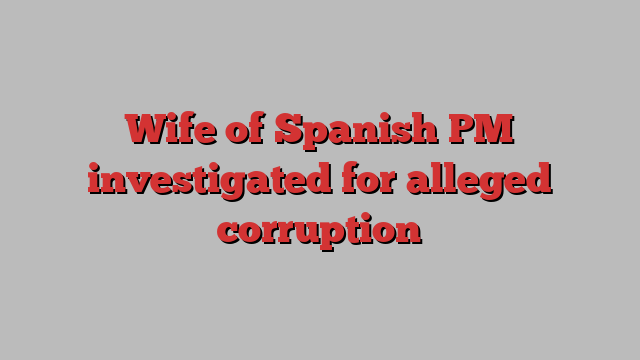
Unlock the Editor’s Digest for free
Roula Khalaf, Editor of the FT, selects her favourite stories in this weekly newsletter.
A Spanish judge has opened a preliminary investigation into the wife of Prime Minister Pedro Sánchez over accusations of corruption, driving political acrimony in Madrid to new highs.
The judge’s surprise move against Begoña Gómez sparked indignation in Sánchez’s Socialist-led government, which dismissed the allegations as “false” and blamed them on rightwing enemies.
Juan Carlos Peinado, the judge, started judicial proceedings after receiving a complaint from a labour union over influence peddling. It alleged that Gómez received favours from private businesses that won government tenders and were awarded subsidies.
Félix Bolaños, Spain’s justice minister, decried the case as “one more false allegation”.
Sánchez told parliament on Wednesday: “On a day like today, and despite the news I have heard, despite everything, I still believe in justice in my country.”
The union that filed the complaint was Manos Limpias (Clean Hands), which has a record of launching anti-corruption litigation and whose leader has far-right links. Its complaint was founded on a series of stories published by news organisations, notably El Confidencial.
The judge must now call witnesses and assess the evidence before deciding whether the case should proceed.
Manos Limpias alleges that Gómez received favours from executives of Air Europa and its parent company, Globalia, in her capacity as director of an Africa research centre that she ran for nearly four years until 2022 at IE University in Madrid. Manos Limpias links her activity to a €475mn bailout the airline received in late 2020 as it struggled to survive the coronavirus pandemic.
Gómez has stayed silent on the allegations in recent weeks and could not be reached for comment on Wednesday. Globalia declined to comment.
IE University confirmed it had received four air tickets from Globalia in 2020 as part of an event sponsorship deal but said it had never received any money from Globalia, nor had its Africa centre.
The conservative opposition called on Sánchez to provide immediate “explanations” to lawmakers about the case.
Esther Muñoz, deputy secretary of the opposition People’s party, said: “It is the head of the government who is putting the spotlight on his wife with his silence, not the People’s party.”
Other ministers in Sanchez’s government hit back at the opposition. María Jesús Montero, Spain’s deputy prime minister, said, “we are facing the worst PP in history” and accused it of getting mixed up with the “practices and discourses of the extreme right”.
Sánchez’s government has been focused in recent weeks on upcoming regional and EU elections and has managed to pass few pieces of legislation.
The PP has slowed down the passage of a controversial bill to grant an amnesty to Catalan separatists involved in a 2017 breakaway bid. Sánchez’s minority coalition government relies on the votes of Catalan lawmakers who will not back more bills until the amnesty law is passed.
A Catalan regional election on May 12 is set to be a test of Sánchez’s standing in the wake of the amnesty deal. The Catalan branch of Sánchez’s Socialist party is leading in the polls, followed by the hardline separatists Junts per Catalunya.

